American Mercenaries Were Hired To Assassinate Politicians In The Middle East
“There was a targeted assassination program in Yemen. I was running it. We did it.”
Cradling an AK-47 and sucking a lollipop, the former American Green Beret bumped along in the back of an armored SUV as it wound through the darkened streets of Aden. Two other commandos on the mission were former Navy SEALs. As elite US special operations fighters, they had years of specialized training by the US military to protect America. But now they were working for a different master: a private US company that had been hired by the United Arab Emirates, a tiny desert monarchy on the Persian Gulf.
On that night, December 29, 2015, their job was to carry out an assassination.
Their armed attack, described to BuzzFeed News by two of its participants and corroborated by drone surveillance footage, was the first operation in a startling for-profit venture. For months in war-torn Yemen, some of America’s most highly trained soldiers worked on a mercenary mission of murky legality to kill prominent clerics and Islamist political figures.
Their target that night: Anssaf Ali Mayo, the local leader of the Islamist political party Al-Islah. The UAE considers Al-Islah to be the Yemeni branch of the worldwide Muslim Brotherhood, which the UAE calls a terrorist organization. Many experts insist that Al-Islah, one of whose members won the Nobel Peace Prize, is no terror group. They say it's a legitimate political party that threatens the UAE not through violence but by speaking out against its ambitions in Yemen.
The mercenaries’ plan was to attach a bomb laced with shrapnel to the door of Al-Islah’s headquarters, located near a soccer stadium in central Aden, a key Yemeni port city. The explosion, one of the leaders of the expedition explained, was supposed to “kill everybody in that office.”
When they arrived at 9:57 at night, all seemed quiet. The men crept out of the SUV, guns at the ready. One carried the explosive charge toward the building. But just as he was about to reach the door, another member of the team opened fire, shooting back along the dimly lit street, and their carefully designed plan went haywire.
Obtained by BuzzFeed News
Drone footage of the operation in Yemen to assassinate a Yemeni leader of Al-Islah, an Islamist political party.
The operation against Mayo — which was reported at the time but until now was not known to have been carried out by American mercenaries — marked a pivot point in the war in Yemen, a brutal conflict that has seen children starved, villages bombed, and epidemics of cholera roll through the civilian population. The bombing was the first salvo in a string of unsolved assassinations that killed more than two dozen of the group’s leaders.
The company that hired the soldiers and carried out the attack is Spear Operations Group, incorporated in Delaware and founded by Abraham Golan, a charismatic Hungarian Israeli security contractor who lives outside of Pittsburgh. He led the team’s strike against Mayo.
Got a tip? You can email tips@buzzfeed.com. To learn how to reach us securely, go to tips.buzzfeed.com.
“There was a targeted assassination program in Yemen,” he told BuzzFeed News. “I was running it. We did it. It was sanctioned by the UAE within the coalition.”
The UAE and Saudi Arabia lead an alliance of nine countries in Yemen, fighting what is largely a proxy war against Iran. The US is helping the Saudi-UAE side by providingweapons, intelligence, and other support.
The press office of the UAE’s US Embassy, as well as its US public affairs company, Harbour Group, did not respond to multiple phone calls and emails.
The revelations that a Middle East monarchy hired Americans to carry out assassinations comes at a moment when the world is focused on the alleged murder of dissident journalist Jamal Khashoggi by Saudi Arabia, an autocratic regime that has close ties to both the US and the UAE. (The Saudi Embassy in the US did not respond to a request for comment. Riyadh has denied it killed Khashoggi, though news reportssuggest it is considering blaming his death on a botched interrogation.)
Golan said that during his company’s months-long engagement in Yemen, his team was responsible for a number of the war’s high-profile assassinations, though he declined to specify which ones. He argued that the US needs an assassination program similar to the model he deployed. “I just want there to be a debate,” he said. “Maybe I’m a monster. Maybe I should be in jail. Maybe I’m a bad guy. But I’m right.”
Spear Operations Group’s private assassination mission marks the confluence of three developments transforming the way war is conducted worldwide:
- Modern counterterrorism combat has shifted away from traditional military objectives — such as destroying airfields, gun emplacements, or barracks — to killing specific individuals, largely reshaping war into organized assassinations.
- War has become increasingly privatized, with many nations outsourcing most military support services to private contractors, leaving frontline combat as virtually the only function that the US and many other militaries have not contracted out to for-profit ventures.
- The long US wars in Afghanistan and Iraq have relied heavily on elite special forces, producing tens of thousands of highly trained American commandos who can demand high private-sector salaries for defense contracting or outright mercenary work.
With Spear Operations Group’s mission in Yemen, these trends converged into a new and incendiary business: militarized contract killing, carried out by skilled American fighters.
Experts said it is almost inconceivable that the United States would not have known that the UAE — whose military the US has trained and armed at virtually every level — had hired an American company staffed by American veterans to conduct an assassination program in a war it closely monitors.
One of the mercenaries, according to three sources familiar with the operation, used to work with the CIA’s “ground branch,” the agency’s equivalent of the military’s special forces. Another was a special forces sergeant in the Maryland Army National Guard. And yet another, according to four people who knew him, was still in the Navy Reserve as a SEAL and had a top-secret clearance. He was a veteran of SEAL Team 6, or DEVGRU, the sources told BuzzFeed News. The New York Times once described that elite unit, famous for killing Osama bin Laden, as a “global manhunting machine with limited outside oversight.”
“What vetting procedures are there to make sure the guy you just smoked is really a bad guy?”
The CIA said it had no information about the mercenary assassination program, and the Navy's Special Warfare Command declined to comment. A former CIA official who has worked in the UAE initially told BuzzFeed News there was no way that Americans would be allowed to participate in such a program. But after checking, he called back: “There were guys that were basically doing what you said.” He was astonished, he said, by what he learned: “What vetting procedures are there to make sure the guy you just smoked is really a bad guy?” The mercenaries, he said, were “almost like a murder squad.”
Whether Spear’s mercenary operation violates US law is surprisingly unclear. On the one hand, US law makes it illegal to “conspire to kill, kidnap, maim” someone in another country. Companies that provide military services to foreign nations are supposed to be regulated by the State Department, which says it has never granted any company the authority to supply combat troops or mercenaries to another country.
Yet, as BuzzFeed News has previously reported, the US doesn’t ban mercenaries. And with some exceptions, it is perfectly legal to serve in foreign militaries, whether one is motivated by idealism or money. With no legal consequences, Americans have served in the Israel Defense Forces, the French Foreign Legion, and even a militia fighting ISIS in Syria. Spear Operations Group, according to three sources, arranged for the UAE to give military rank to the Americans involved in the mission, which might provide them legal cover.
Despite operating in a legal and political gray zone, Golan heralds his brand of targeted assassinations as a precision counterterrorism strategy with fewer civilian casualties. But the Mayo operation shows that this new form of warfare carries many of the same old problems. The commandos’ plans went awry, and the intelligence proved flawed. And their strike was far from surgical: The explosive they attached to the door was designed to kill not one person but everyone in the office.
Aside from moral objections, for-profit targeted assassinations add new dilemmas to modern warfare. Private mercenaries operate outside the US military’s chain of command, so if they make mistakes or commit war crimes, there is no clear system for holding them accountable. If the mercenaries had killed a civilian in the street, who would have even investigated?
The Mayo mission exposes an even more central problem: the choice of targets. Golan insists that he killed only terrorists identified by the government of the UAE, an ally of the US. But who is a terrorist and who is a politician? What is a new form of warfare and what is just old-fashioned murder for hire? Who has the right to choose who lives and who dies — not only in the wars of a secretive monarchy like the UAE, but also those of a democracy such as the US?
BuzzFeed News has pieced together the inside story of the company’s attack on Al-Islah’s headquarters, revealing what mercenary warfare looks like now — and what it could become.
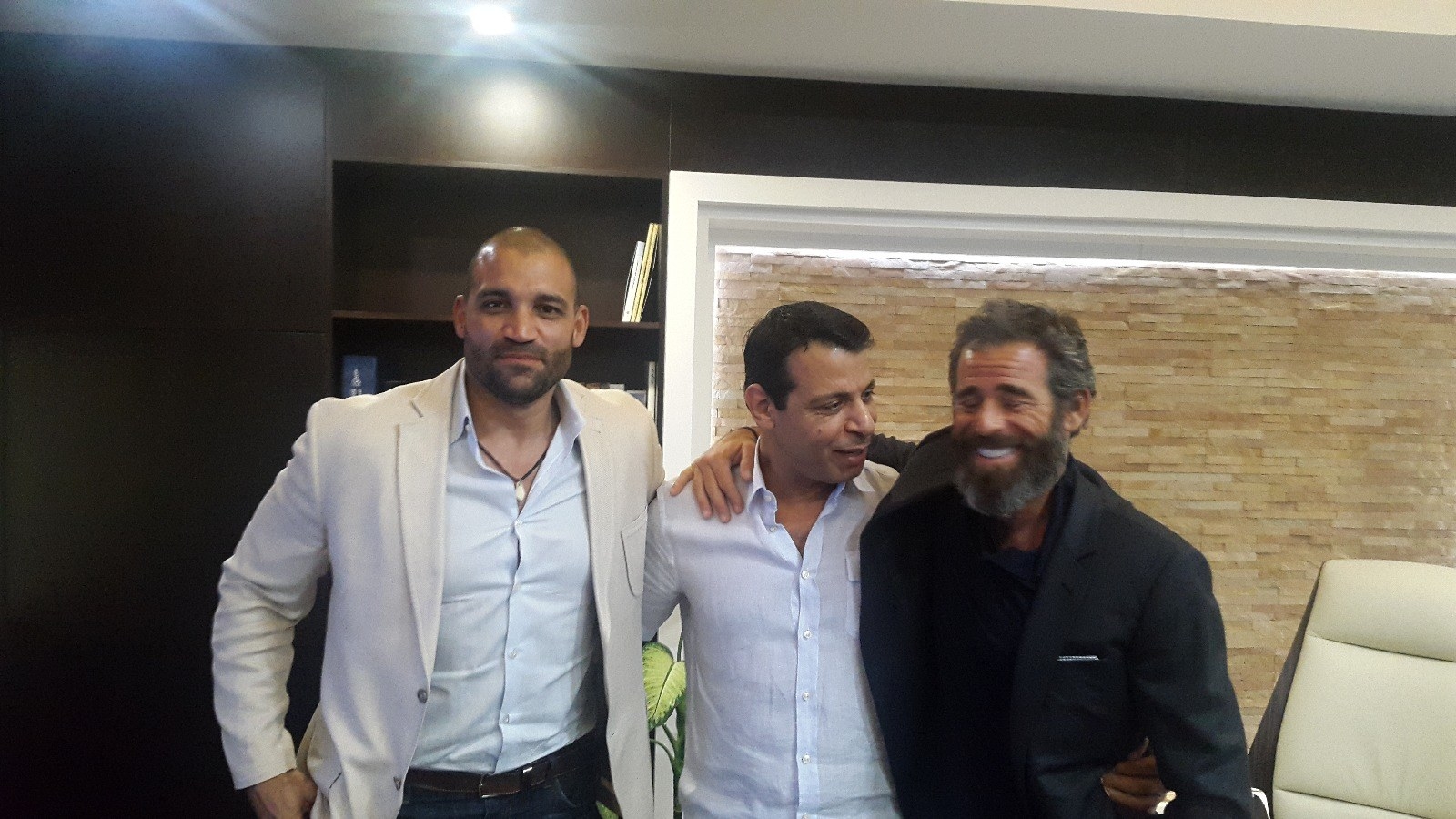
Provided to BuzzFeed News
Left to right: Isaac Gilmore, Mohammed Dahlan, and Abraham Golan.
The deal that brought American mercenaries to the streets of Aden was hashed out over a lunch in Abu Dhabi, at an Italian restaurant in the officers’ club of a UAE military base. Golan and a chiseled former US Navy SEAL named Isaac Gilmore had flown in from the US to make their pitch. It did not, as Gilmore recalled, begin well.
Their host was Mohammed Dahlan, the fearsome former security chief for the Palestinian Authority. In a well-tailored suit, he eyed his mercenary guests coldly and told Golan that in another context they’d be trying to kill each other.
Indeed, they made an unlikely pair. Golan, who says he was born in Hungary to Jewish parents, maintains long-standing connections in Israel for his security business, according to several sources, and he says he lived there for several years. Golan once partied in London with former Mossad chief Danny Yatom, according to a 2008 Mother Jones article, and his specialty was “providing security for energy clients in Africa.” One of his contracts, according to three sources, was to protect ships drilling in Nigeria’s offshore oil fields from sabotage and terrorism.
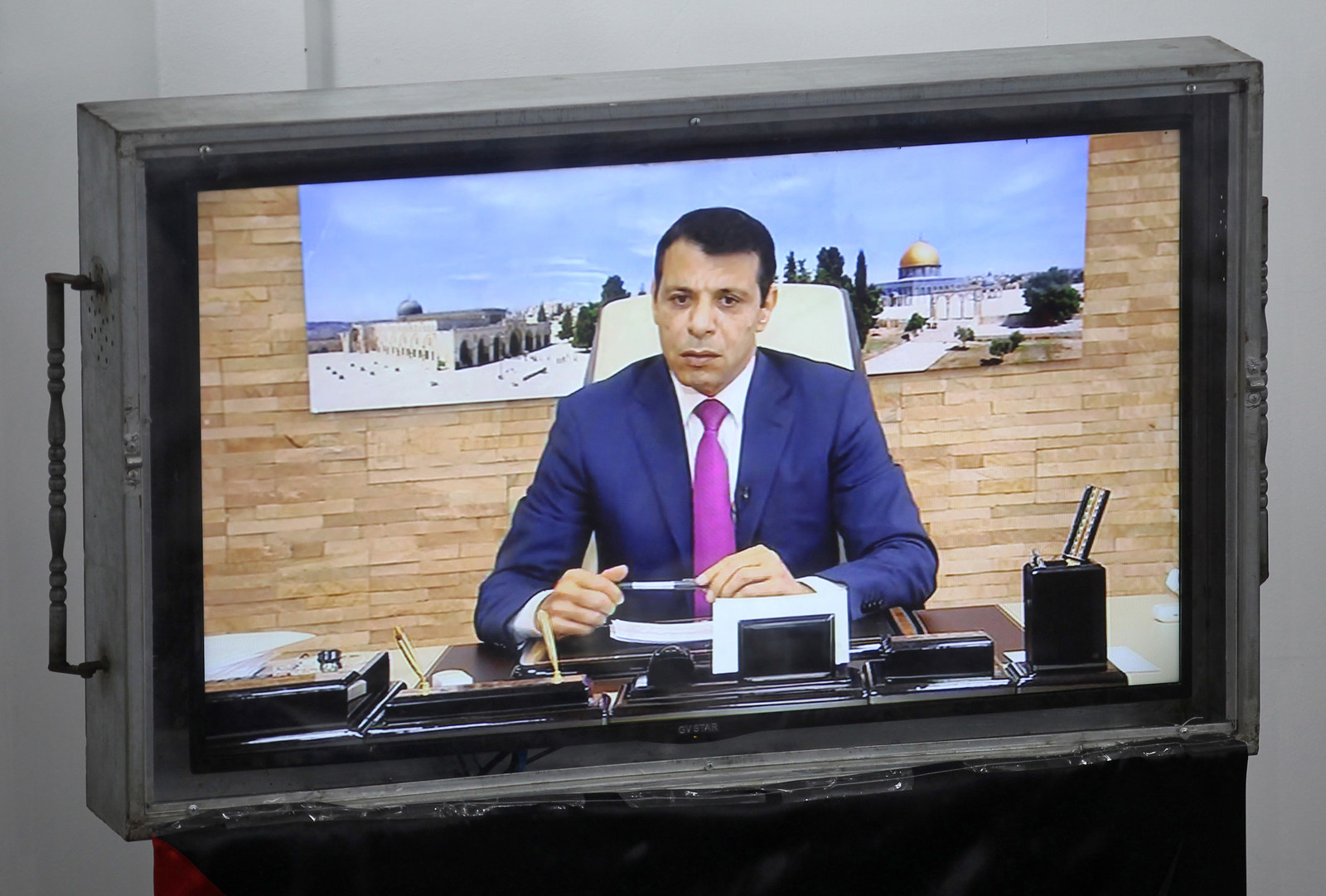
Said Khatib / AFP / Getty Images
Mohammed Dahlan on a video conference last year.
Golan, who sports a full beard and smokes Marlboro Red cigarettes, radiates enthusiasm. A good salesman is how one former CIA official described him. Golan himself, who is well-read and often cites philosophers and novelists, quotes André Malraux: “Man is not what he thinks he is but what he hides.”
Golan says he was educated in France, joined the French Foreign Legion, and has traveled around the world, often fighting or carrying out security contracts. In Belgrade, he says, he got to know the infamous paramilitary fighter and gangster Željko Ražnatović, better known as Arkan, who was assassinated in 2001. “I have a lot of respect for Arkan,” he told BuzzFeed News.
BuzzFeed News was unable to verify parts of Golan’s biography, including his military service, but Gilmore and another US special operations veteran who has been with him in the field said it’s clear he has soldiering experience. He is considered competent, ruthless, and calculating, said the former CIA official. He’s “prone to exaggeration,” said another former CIA officer, but “for crazy shit he’s the kind of guy you hire.”
"For crazy shit he’s the kind of guy you hire.”
Dahlan, who did not respond to multiple messages sent through associates, grew up in a refugee camp in Gaza, and during the 1980s intifada he became a major political player. In the ’90s he was named the Palestinian Authority’s head of security in Gaza, overseeing a harsh crackdown on Hamas in 1995 and 1996. He later met President George W. Bush and developed strong ties to the CIA, meeting the agency’s director, George Tenet, several times. Dahlan was once touted as a possible leader of the Palestinian Authority, but in 2007 he fell from grace, accused by the Palestinian Authority of corruption and by Hamas of cooperating with the CIA and Israel.
A man without a country, he fled to the UAE. There he reportedly remade himself as a key adviser to Crown Prince Mohammed bin Zayed Al Nahyan, or MBZ, known as the true ruler of Abu Dhabi. The former CIA officer who knows Dahlan said, “The UAE took him in as their pit bull.”
Now, over lunch in the officers’ club, the pit bull challenged his visitors to tell him what was so special about fighters from America. Why were they any better than Emirati soldiers?
Golan replied with bravado. Wanting Dahlan to know that he could shoot, train, run, and fight better than anyone in the UAE’s military, Golan said: Give me your best man and I’ll beat him. Anyone.
The Palestinian gestured to an attentive young female aide sitting nearby. She’s my best man, Dahlan said.
The joke released the tension, and the men settled down. Get the spaghetti, recommended Dahlan.
The UAE, with vast wealth but only about 1 million citizens, relies on migrant workers from all over the world to do everything from cleaning its toilets to teaching its university students. Its military is no different, paying lavish sums to eager US defense companies and former generals. The US Department of Defense has approved at least $27 billion in arms sales and defense services to the UAE since 2009.
Retired US Army Gen. Stanley McChrystal once signed up to sit on the board of a UAE military company. Former Navy SEAL and Vice Admiral Robert Harward runs the UAE division of Lockheed Martin. The security executive Erik Prince, now entangled in special counsel Robert Mueller’s investigation into Russian election interference, set up shop there for a time, helping the UAE hire Colombian mercenaries.
And as BuzzFeed News reported earlier this year, the country embeds foreigners in its military and gave the rank of major general to an American lieutenant colonel, Stephen Toumajan, placing him in command of a branch of its armed forces.
The US draws the line at combat; it does not hire mercenaries to carry out attacks. But that line can get blurry.
The UAE is hardly alone in using defense contractors; in fact, it is the US that helped pioneer the worldwide move toward privatizing the military. The Pentagon pays companies to carry out many traditional functions, from feeding soldiers to maintaining weapons to guarding convoys.
The US draws the line at combat; it does not hire mercenaries to carry out attacks or engage directly in warfare. But that line can get blurry. Private firms provide heavily armed security details to protect diplomats in war zones or intelligence officers in the field. Such contractors can engage in firefights, as they did in Benghazi, Libya, when two contractors died in 2012 defending a CIA post. But, officially, the mission was protection, not warfare.
Outside the US, hiring mercenaries to conduct combat missions is rare, though it has happened. In Nigeria, a strike force reportedly led by longtime South African mercenary Eeben Barlow moved successfully against the Islamist militant group Boko Haram in 2015. A company Barlow founded, Executive Outcomes, was credited with crushing the bloody RUF rebel force in war-torn Sierra Leone in the 1990s.
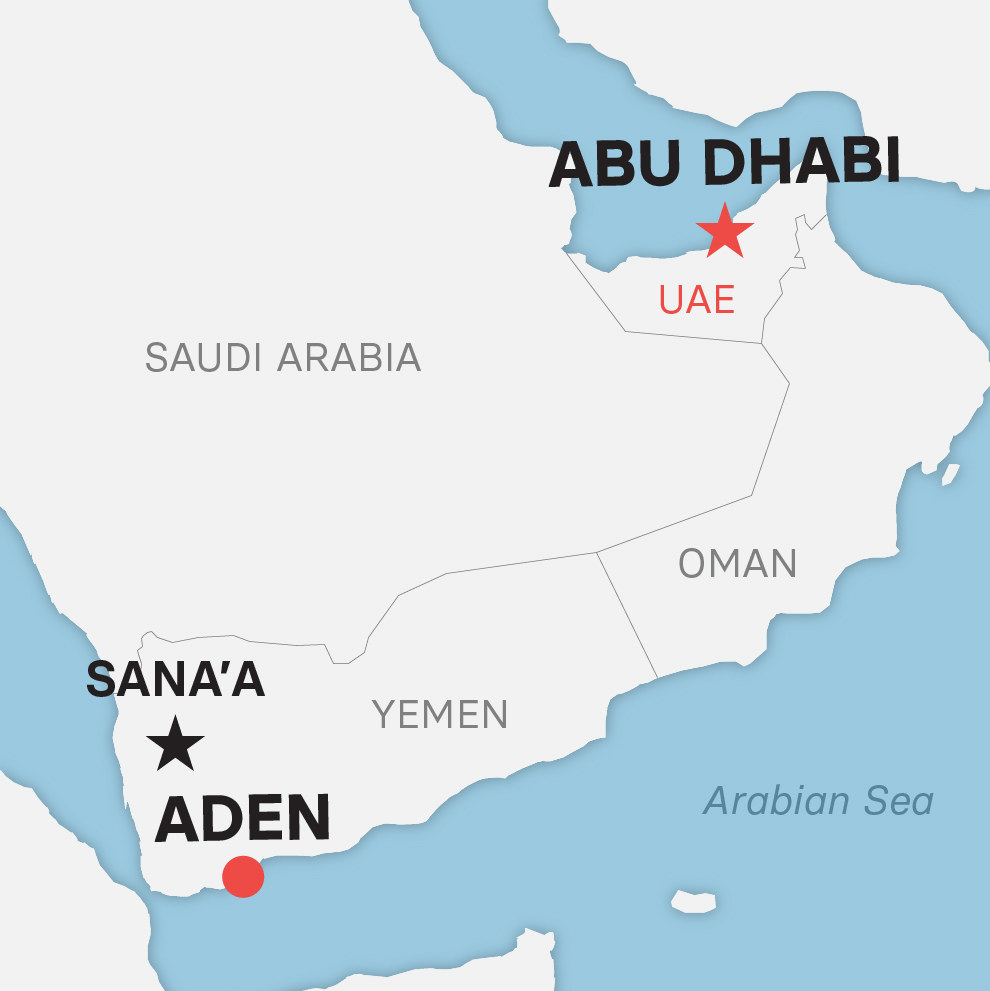
BuzzFeed News
But over spaghetti with Dahlan, Golan and Gilmore were offering an extraordinary form of mercenary service. This was not providing security details, nor was it even traditional military fighting or counterinsurgency warfare. It was, both Golan and Gilmore say, targeted killing.
Gilmore said he doesn’t remember anyone using the word “assassinations” specifically. But it was clear from that first meeting, he said, that this was not about capturing or detaining Al-Islah’s leadership. “It was very specific that we were targeting,” said Gilmore. Golan said he was explicitly told to help “disrupt and destruct” Al-Islah, which he calls a “political branch of a terrorist organization.”
He and Gilmore promised they could pull together a team with the right skillset, and quickly.
In the weeks after that lunch, they settled on terms. The team would receive $1.5 million a month, Golan and Gilmore told BuzzFeed News. They’d earn bonuses for successful kills — Golan and Gilmore declined to say how much — but they would carry out their first operation at half price to prove what they could do. Later, Spear would also train UAE soldiers in commando tactics.
Golan and Gilmore had another condition: They wanted to be incorporated into the UAE Armed Forces. And they wanted their weapons — and their target list — to come from uniformed military officers. That was “for juridical reasons,” Golan said. “Because if the shit hits the fan,” he explained, the UAE uniform and dog tags would mark “the difference between a mercenary and a military man.”
Dahlan and the UAE government signed off on the deal, Golan and Gilmore said, and Spear Operations Group got to work.
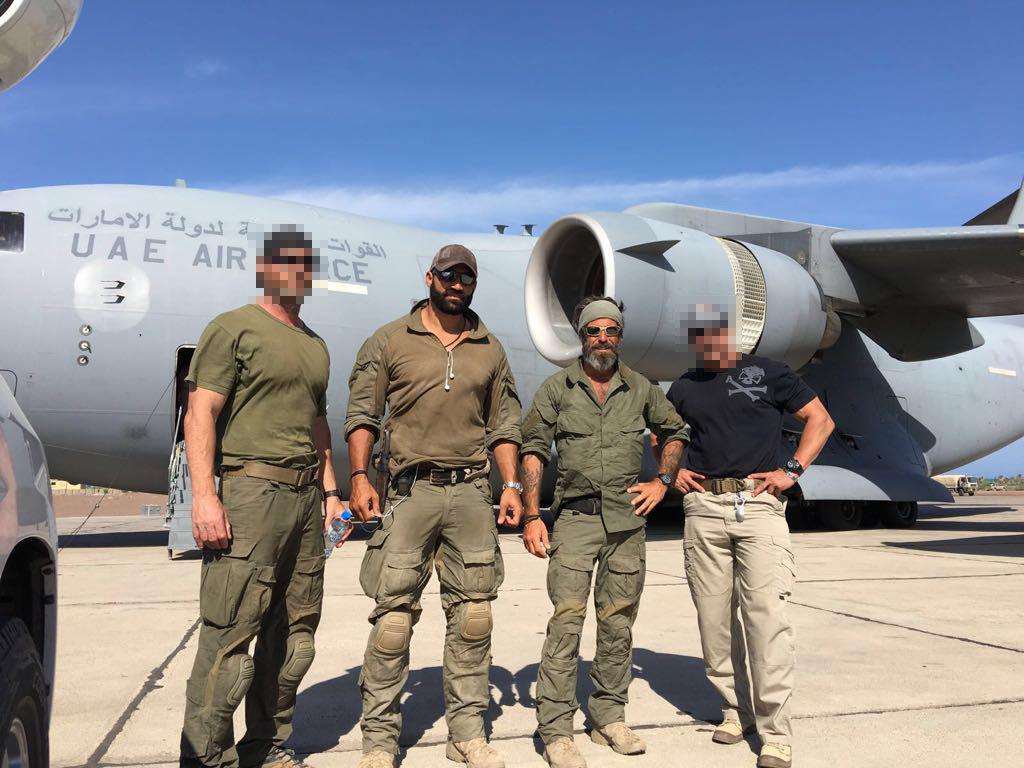
Courtesy Abraham Golan
Standing in front of a UAE military plane are Gilmore (middle left), Golan (middle right), and two soldiers on their mercenary team.
Back in the US, Golan and Gilmore started rounding up ex-soldiers for the first, proof-of-concept job. Spear Operations Group is a small company — nothing like the security behemoths such as Garda World Security or Constellis — but it had a huge supply of talent to choose from.
A little-known consequence of the war on terror, and in particular the 17 combined years of US warfare in Iraq and Afghanistan, is that the number of special operations forces has more than doubled since 9/11, from 33,000 to 70,000. That’s a vast pool of crack soldiers selected, trained, and combat-tested by the most elite units of the US military, such as the Navy SEALs and Army Rangers. Some special operations reservists are known to engage in for-profit soldiering, said a high-level SEAL officer who asked not to be named. “I know a number of them who do this sort of thing,” he said. If the soldiers are not on active duty, he added, they are not obligated to report what they’re doing.
But the options for special operations veterans and reservists aren’t what they were in the early years of the Iraq War. Private security work, mostly protecting US government officials in hostile environments, lacks the excitement of actual combat and is more “like driving Miss Daisy with an M4” rifle, as one former contractor put it. It also doesn’t pay what it used to. While starting rates for elite veterans on high-end security jobs used to be $700 or $800 a day, contractors said, now those rates have dropped to about $500 a day. Golan and Gilmore said they were offering their American fighters $25,000 a month — about $830 a day — plus bonuses, a generous sum in almost any market.
Still, the Yemen gig crossed into uncharted territory, and some of the best soldiers declined. “It was still gray enough,” Gilmore said, “that a lot of guys were like, ‘Ah, I’m good.’ ”
Gilmore himself said he has an imperfect record. During a live-fire training mission he led, back in his Navy days, he says he accidentally shot another SEAL. Gilmore said that’s what prompted him to leave the Navy, in 2011. His last major job before joining Spear was as an executive at an artisanal Tequila company.
That stain on his military career, he said, is also what prompted him to take the risk with Spear: He was an outsider, he wasn’t in the reserves, and he didn’t have a pension to worry about.
By the end of 2015, Golan, who led the operation, and Gilmore had cobbled together a team of a dozen men. Three were American special ops veterans, and most of the rest were former French Foreign Legionnaires, who were cheaper: only about $10,000 per month, as Gilmore remembers it, less than half of what he and Golan said they budgeted for their American counterparts.
They gathered at a hotel near Teterboro Airport in New Jersey. They were dressed in an assortment of military fatigues, some in camouflage, some in black. Some were bearded and muscled, others tattooed and wiry.
When it was time to go, they convinced the hotel staff to give them the US flag flying outside, Gilmore said. In a makeshift ceremony, they folded it up into a small triangle and took it with them.
They also packed a few weeks’ worth of military “meals ready to eat,” body armor, communications gear, and medical equipment. Gilmore said he brought a utility knife with a special crimping tool to prepare the blasting caps on explosives. The team was sure to stock up on whiskey, too — three cases of Basil Hayden’s since it would be impossible to get any alcohol in Yemen, let alone the good stuff.
On December 15, they boarded a chartered Gulfstream G550. Once airborne, Gilmore walked to the cockpit and told the pilots that there was a slight change to their flight plan. After refueling in Scotland, they wouldn’t be flying to Abu Dhabi’s main commercial airport but to a UAE military base in the desert.
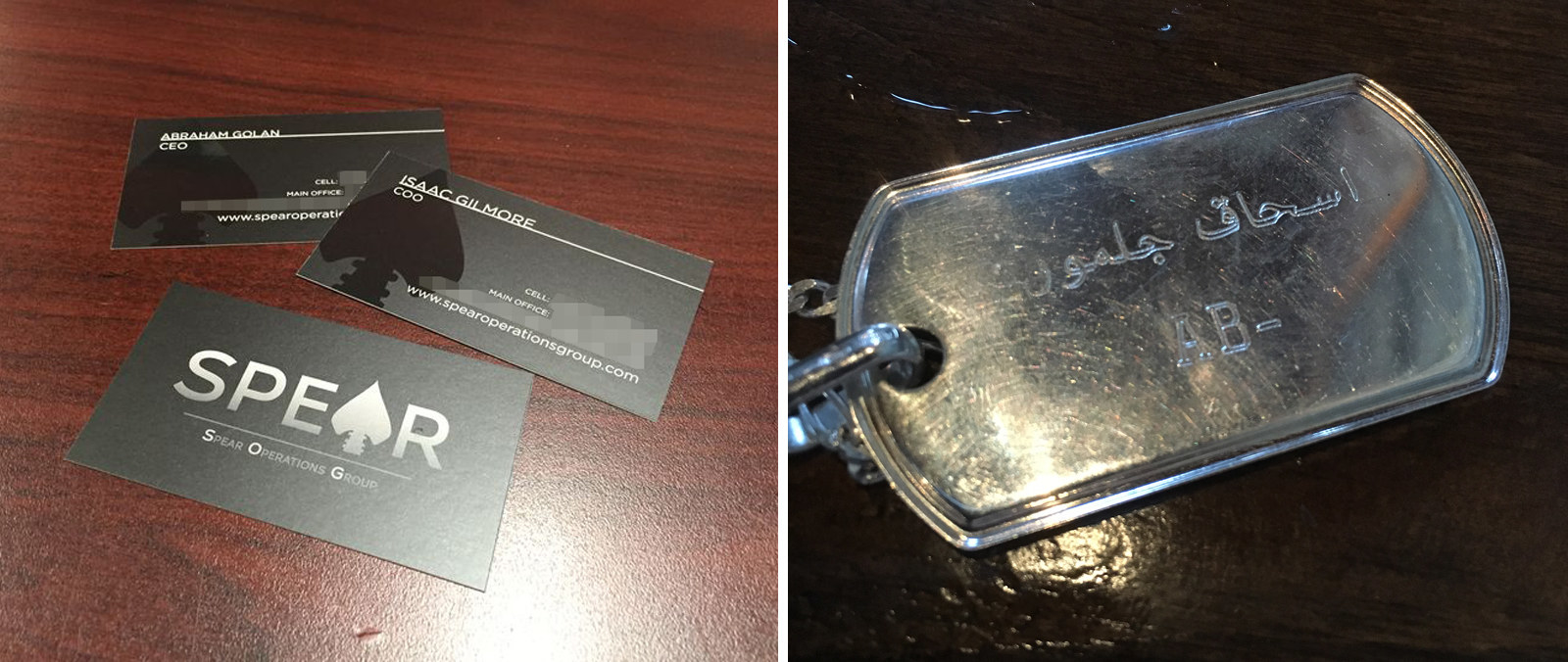
Obtained by BuzzFeed News
Left: Business cards for Spear Operations Group; Right: Gilmore's dog tags
From that base, the mercenaries took a UAE Air Force transport plane to another base in Assab, Eritrea. During that flight, Gilmore recalled, a uniformed Emirati officer briefed them and handed them a hit list — 23 cards with 23 names and 23 faces. Each card featured rudimentary intelligence: the person’s role in Yemeni politics, for example, or grid coordinates for a residence or two.
Gilmore said some were members of Al-Islah, some were clerics, and some were out-and-out terrorists — but he conceded he couldn’t be sure.
BuzzFeed News has obtained one of the target cards. On it is a man’s name, photograph, telephone number, and other information. At the top right is the insignia of the UAE Presidential Guard.
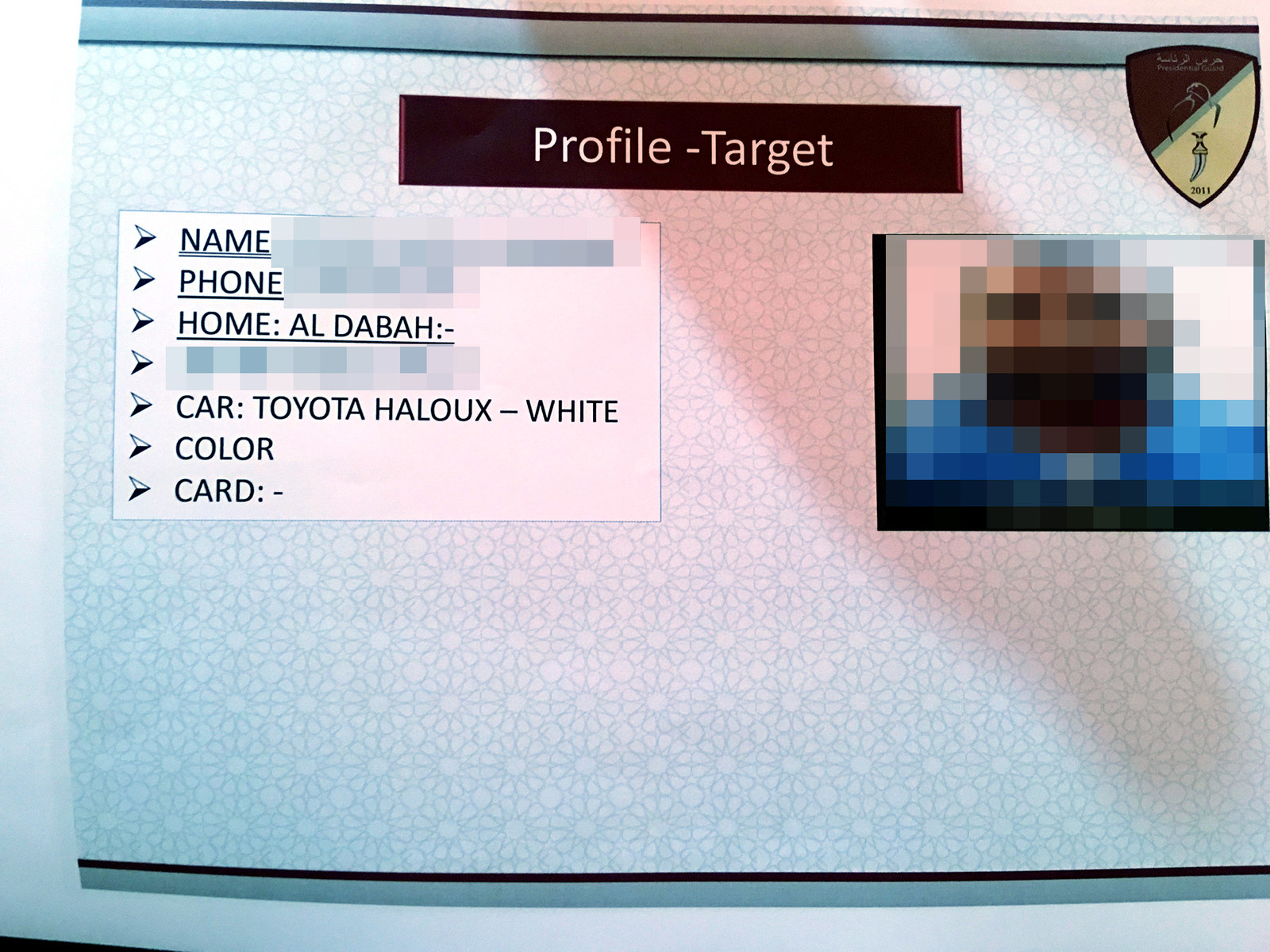
Obtained by BuzzFeed News
Conspicuously absent is why anyone wanted him dead, or even what group he was associated with. The man could not be reached for comment, and it is not known if he is alive or dead.
Assassinations have historically played a limited part in US warfare and foreign policy. In 1945, “Wild Bill” Donovan, the director of the CIA’s predecessor agency, the OSS, was handed a finalized plan to deploy kill teams across Europe to attack Nazi leaders such as Hitler, Himmler, and Goering, as well as SS officers with a rank of major or above, according to a biography of Donovan by Douglas Waller. But the OSS chief got queasy about the “wholesale assassination” project and canceled it.
During the Cold War, the CIA played a role in plots to assassinate foreign leaders, such as Patrice Lumumba of the Democratic Republic of Congo, Rafael Trujillo of the Dominican Republic, and Ngo Dinh Diem of South Vietnam. Later in the Vietnam War, the US launched the Phoenix program, in which the CIA often teamed up with US military units to “neutralize” — or, critics say, assassinate — Viet Cong leaders. Even so, targeted killings were not a central pillar of US military strategy in Vietnam. And after Congress exposed CIA activities in the 1970s, the US banned assassinations of foreign leaders.
Then came the war on terror.
Under President George W. Bush, the CIA and the military used drones to kill terrorists, and the CIA developed covert assassination capabilities. President Barack Obama halted the agency’s secret assassination program but drastically ramped up the use of drone strikes in Pakistan, Yemen, Afghanistan, and Somalia. Soon the CIA and the military were using the aircraft — piloted remotely using video monitors — to kill people whose names the US didn’t even know, through “signature strikes” based solely on a target’s associations and activities. President Donald Trump has further loosened the rules for drone strikes.
But while private contractors often maintain the drones and sometimes even pilot them, there is one action they reportedly cannot take: Only a uniformed officer can push the button that fires the drone’s missile and kills the target.
With organized assassinations having become a routine part of war in the region, the UAE developed its own appetite. The country had begun to flex more military muscle, and by 2015 it had become a major player in the war in Yemen. It quickly targeted Al-Islah, an Islamist political party that won more than 20% of the vote in Yemen’s most recent parliamentary election, held in 2003.
Elisabeth Kendall, an expert on Yemen at the University of Oxford, points out that unlike al-Qaeda or other terrorist groups, which try to seize power through violence, Al-Islah participates in the political process. But, she said, the US rationale for drone strikes has legitimized other countries’ pursuit of their own assassinations: “The whole very watery, vague notion of a war on terror has left the door wide open to any regime saying, ‘This is all a war on terror.’ ”
At the top of the deck of targets they got from the UAE, Gilmore and Golan said, was Mayo, Al-Islah’s leader in Aden. Mayo had close-cropped hair, wire-rimmed glasses, and a wisp of goatee to go with his mustache. He had spoken out against US drone strikes in Yemen, telling the Washington Post in 2012 that rather than stopping al-Qaeda they had instead fueled its growth.
Asked about the ethics and legality of killing unarmed Al-Islah political leaders, as opposed to armed terrorists, Golan responded, “I think this dichotomy is a purely intellectual dichotomy.”
Got a tip? You can email tips@buzzfeed.com. To learn how to reach us securely, go to tips.buzzfeed.com.
Golan said he models his assassination business on Israel’s targeted killing program, which has been underway since the country was founded, and which, despite some high-profile errors and embarrassments, he claims is done properly. He argues there are some terrorist enemies so dangerous and implacable — and so difficult to arrest — that assassination is the best solution.
He insists his team is not a murder squad. As evidence, Golan recounted how, as their mission continued, the UAE provided names with no affiliation to Al-Islah or any group, terrorist or otherwise. Golan said he declined to pursue those individuals, a claim that could not be verified.
The people Spear did target, he and Gilmore said, were legitimate because they were selected by the government of the UAE, an ally of the United States that was engaged in a military action supported by the US. Gilmore said that he and Golan told the UAE they would never act against US interests. And Golan claimed that, based on his military experience, he could tell if a target was a terrorist after just a week or two of surveillance.
Still, Gilmore acknowledged that some of the targets may have been people who merely fell out of favor with the ruling family. Referring to the country’s Crown Prince Mohammed bin Zayed, Gilmore said, “There is the possibility that the target would be someone who MBZ doesn’t like. We’d try to make sure that didn’t happen.”
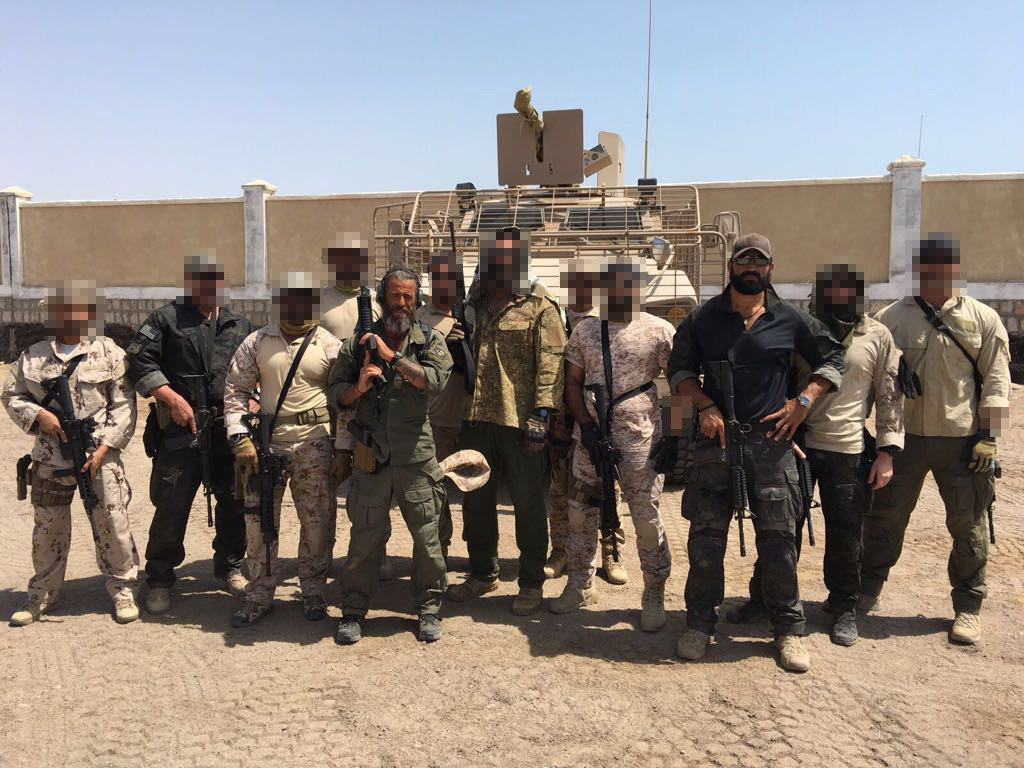
Obtained by BuzzFeed News
When they reached Aden, the mercenaries were issued weapons. They were surprised at the low quality — shitty Chinese assault rifles and RPGs, according to Gilmore and Golan.
At some point, they also received their official designation in the Emirati military. Golan was named a colonel and Gilmore a lieutenant colonel, a heady “promotion” for a man who had been discharged from the Navy as a petty officer.
Gilmore still has his UAE dog tag, a rectangle of white gold imprinted with his blood type, AB-negative. His name is in English on one side and in Arabic on the other.
Using sources handed to them by the UAE’s intelligence network, Gilmore said, the team established Mayo’s daily life pattern — the home he lived in, the mosque he prayed at, the businesses he frequented.
Christmas passed with the mercenaries sharing their whiskey and plotting how exactly they should kill Mayo. A raid, a bomb, a sniper? “We had five or six courses of action to go after him,” Gilmore said.
Christmas passed with the mercenaries sharing their whiskey and plotting how exactly they should kill Mayo.
After some quick surveillance of the Al-Islah headquarters, they decided on explosives. Gilmore said he drew the mission plan out on the floor of the tent, with a black Sharpie. It showed the angles of approach, the attack, and, most important, the escape route.
After he briefed his colleagues, Gilmore took out his knife, cut through the tough tent fabric, and burned the mission plan. “I don’t want any of that with my handwriting on it floating around,” he said.
Two days later, Gilmore recalled, they got the word that Mayo was in his office for a large meeting.
Golan gathered with Gilmore, another ex-SEAL, and a former Delta Force soldier, for the mission. They had left behind their wallets and all identifying information, and they wore an assortment of motley uniforms — Gilmore said he wore a baseball hat and Salomon Speedcross trail-running shoes, with a chest rig full of spare ammunition magazines. All held AK-47s, and one had the bomb loaded with shrapnel.
Gilmore, Golan, and two others climbed into an armored SUV with a plainclothes Emirati soldier at the wheel. The French Foreign Legion soldiers were in another SUV, which would stop a short distance from the attack site, ready to rush in should the Americans get into a jam. The gates of their base opened and they pulled out onto the nighttime streets of Aden.
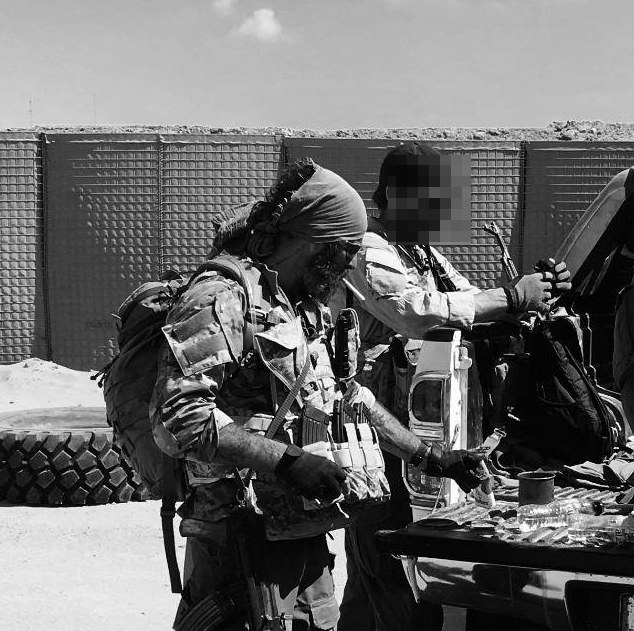
Provided to BuzzFeed News
Golan with a member of his mercenary team.
It’s unclear exactly what went wrong.
Right before the mercenary reached the front door, carrying the explosive charge meant to kill Mayo, one of his fellow fighters at the back of the SUV opened fire, shooting along the backstreet.
There was a drone high overhead, and the video, obtained by BuzzFeed News, shows gunfire but not what the American is shooting at. The drone video doesn’t show anyone shooting back at the mercenaries.
Gilmore said he himself fired at someone on the street, but his gun jammed. He said he wasn’t sure who was firing at them. In any case, the mercenary carrying the explosive to the building carried on despite the commotion around him — for a full 20 seconds, the video shows.
To make their escape, the mercenaries ran into UAE military vehicles. Then suddenly there was an explosion — the bomb on the door — followed by a second, bigger one. The second explosion was the mercenaries’ SUV. Gilmore and Golan say they booby-trapped it to disguise the source of the bomb, confuse Al-Islah, and add to the destruction.
The team returned to base without something they all knew they needed. US special operations forces call it positive identification, or “PID” — proof that Mayo was dead. A photo, for example, or DNA.
“That caused some problems with Dahlan,” Gilmore recalled.
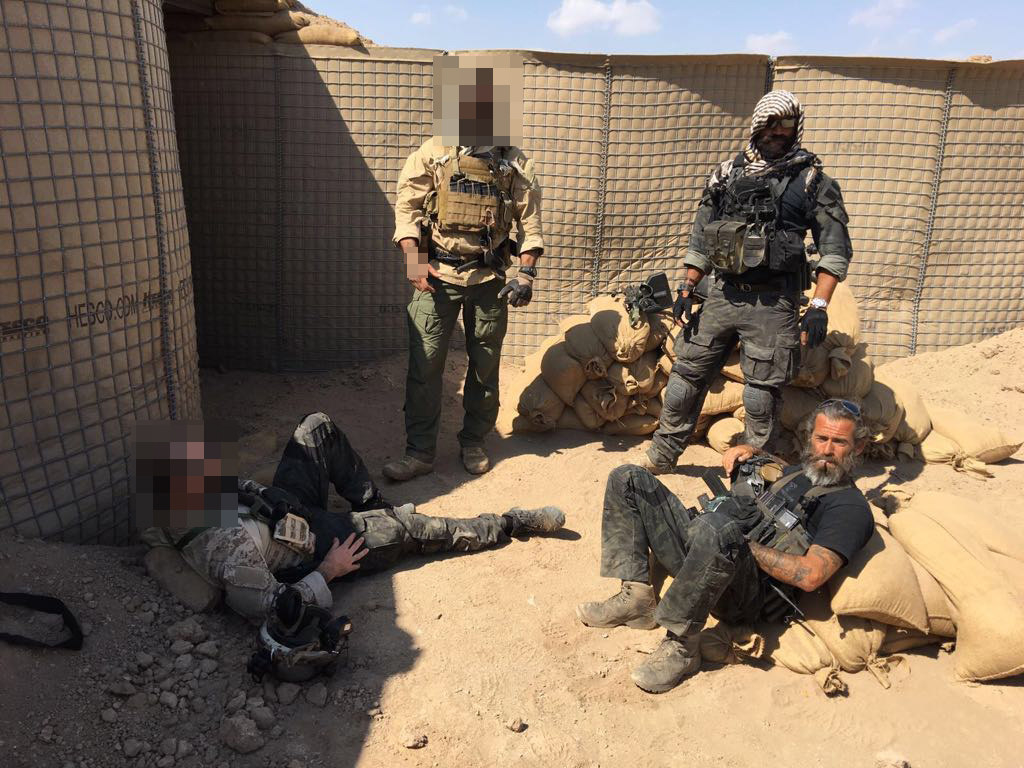
Obtained by BuzzFeed News
Still, Mayo seemed to have vanished. He rarely posted on his Facebook page, and for a time, Gilmore and Golan said, he wasn’t seen in public.
Yet Al-Islah didn’t announce his death, as it would when other members got assassinated. The reason, a spokesperson for Al-Islah said in a phone interview, is that Mayo is alive — he had left the building 10 minutes before the attack and as of July was living in Saudi Arabia. No one, the spokesperson said, died in the mercenaries’ assault.
Mayo seems to have reemerged in Yemeni politics. In May he was nominated to a post by the president of Yemen, Abed Rabbo Mansour Hadi, according to Charles Schmitz, a specialist on the Middle East and Yemen at Towson University in Maryland. Schmitz said he found a recent photo of Mayo standing in a group with the UN envoy to Yemen.
Golan maintains that, at the very least, Mayo was neutralized for a time. “For me it’s a success,” he said, “as long as the guy disappeared.”
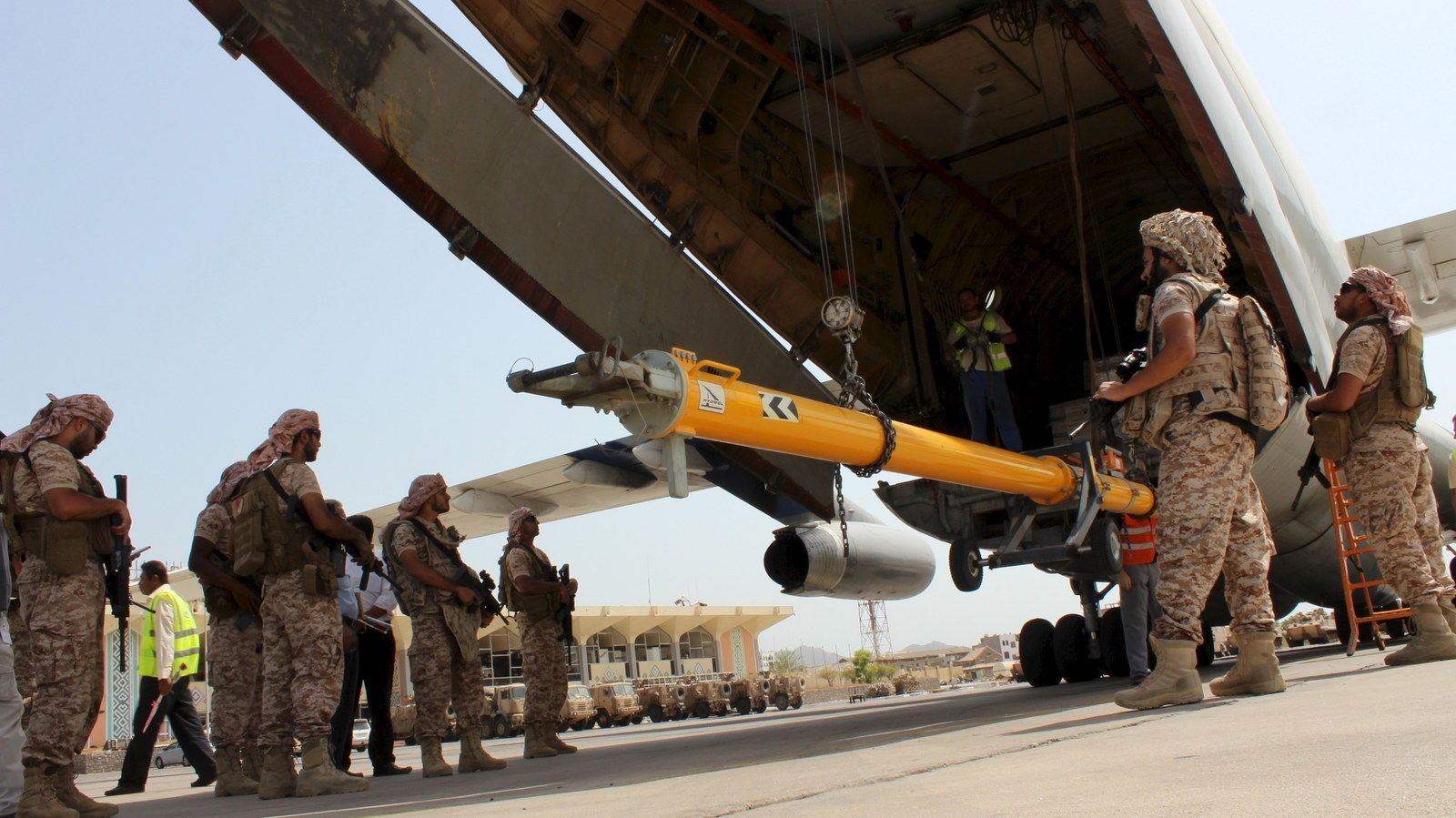
Nasser Awad / Reuters
Soldiers from the United Arab Emirates stand guard as military equipment is unloaded from a UAE military plane at the airport in Aden, Aug. 12, 2015.
Even though it failed to kill Mayo, the mercenaries’ bomb attack seems to have ushered in a new phase in the UAE’s war against Al-Islah. “It was the exclamation point that set the tone that Al-Islah was now going to be targeted,” said Schmitz.
The Al-Islah spokesperson who spoke to BuzzFeed News recited the date by memory: December 29, 2015. “It was the first attack,” he said.
As 2016 progressed, those watching the deteriorating situation in Yemen began to notice that members of Al-Islah, and other clerics in Aden, were dropping dead at an alarming pace. “It does appear to be a targeted campaign,” said Gregory Johnsen of the Arabia Foundation, who in 2016 served on a UN panel investigating the Yemen war. “There have been 25 to 30 assassinations,” he said, though a few appear to be the work of ISIS. (Johnsen used to write for BuzzFeed News.)
“There is a widespread belief on the ground,” said Kendall, the University of Oxford expert, “that the UAE is behind the assassination of Al-Islah officials and activists.”
Golan said his team killed several of the dead but refused to give an exact number or names.
When BuzzFeed News read Gilmore the names of some of the dead, he nodded in recognition at two of them — “I could probably recognize their faces” — and said they were among the team’s targets. But he said he hadn’t been involved in killing them.
Golan said his team killed several of the dead but refused to give an exact number or names. But after their first semi-botched mission, the mercenaries rebooted.
They got rid of the French Foreign Legionnaires, replacing them with Americans. The Emiratis also provided them with better weapons and better equipment, Golan and Gilmore said: C4 explosives, pistols fitted with silencers, and high-end American-made M4 rifles. They were also outfitted with motorbikes they could use to scoot through Aden’s traffic and affix magnetized bombs to cars. All the equipment, they said, came from the UAE military.
Gilmore stayed on for only a short time. He said he left Spear in April 2016. He and Golan declined to say why, but Gilmore said he wishes he had been more aggressive in Yemen. “If I could do it over again we would have been less risk-averse,” he said. “We could have done some amazing things — although we also could have done some amazing things and all ended up in jail.”
One new member of the team, hired in early 2016, was the veteran of SEAL Team 6, Daniel Corbett, according to three sources and confirmed by photos. Corbett was a superb soldier, say those who know him, and had served multiple combat tours in Afghanistan and Iraq. He was still in the reserves, so the US military could deploy him at any moment; he collected a government salary; and he was supposed to report for monthly drills. And yet he was in Yemen on a private contract to work for a foreign military. It is unclear if he himself was involved in missions to assassinate anyone.
In a mysterious development, Corbett is currently in jail in Serbia, where he is being investigated for illegal handgun possession. The American veteran has been held there since February 2018. Corbett could not be reached, and his lawyer did not respond to calls seeking comment.
As they went about their work in Yemen, the mercenaries stayed in huts, sleeping in cots. Some carried distinctive weapons for potential close-in fighting. One, according to photographs, carried two knives on his belt that he could draw cross-handed. Another carried a small tomahawk.
The team began to develop what Gilmore called “esprit de corps.” They flew a makeshift flag featuring a skull and crossed swords — a kind of Jolly Roger on a black background — and painted that emblem onto their military vehicles and their living quarters.
Much about the Spear mercenary team remains unknown, and some who participated made clear they have no desire to shed light on what went down. Asked if he’d been deployed in the Yemen mission, one of the Americans replied, “If I was, you know I can’t discuss it.” The former Green Beret who was sucking a lollipop during the mission sent BuzzFeed News a text message: “A big story for you could be a tragic story for the cast of characters; especially if they are good men doing what was right but not necessarily legal.”
For his part, Gilmore said he “would have preferred that this stay off the radar.” But he decided to speak to BuzzFeed News because “once this comes out there’s no way that I’m going to stay out of it, so I’d prefer to own it. And I’m not going to try to hide from what I did.”
“It’s still,” he said, “some variety of the future of warfare.”
Gilmore is out of the mercenary business. He has since found himself in another gray-zone line of work, albeit one that’s far less dangerous. He said he’s with a California company that plans to make cannabis oil for vaporizers. ●
Jules Darmanin in Paris contributed reporting to this story.
https://www.buzzfeednews.com/article/aramroston/mercenaries-assassination-us-yemen-uae-spear-golan-dahlan
https://www.buzzfeednews.com/article/aramroston/mercenaries-assassination-us-yemen-uae-spear-golan-dahlan




Geen opmerkingen:
Een reactie posten